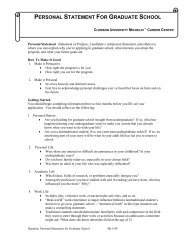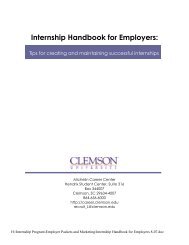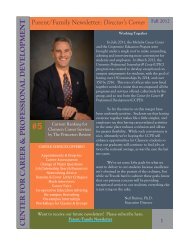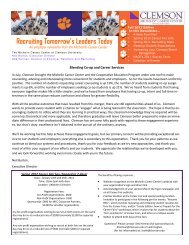Career Guide - Michelin Career Center - Clemson University
Career Guide - Michelin Career Center - Clemson University
Career Guide - Michelin Career Center - Clemson University
You also want an ePaper? Increase the reach of your titles
YUMPU automatically turns print PDFs into web optimized ePapers that Google loves.
Be: Marketable<br />
BEFORE THE INTERVIEW<br />
Research Employers<br />
The number one complaint from<br />
employers are candidates who<br />
are not prepared for the interview.<br />
Researching the employer will help<br />
you decide if you are truly interested<br />
in working for the employer, discover<br />
the career paths available, and,<br />
most importantly, prepare for the<br />
interview. Here is what you should<br />
look for:<br />
• The basics: Products and services,<br />
organizational structure, operating<br />
divisions, location of facilities,<br />
major competitors, typical career<br />
paths and available training and<br />
development programs.<br />
• Performance and personnel: Size and number of employees,<br />
accomplishments, sales, financial performance, research<br />
and development activities, employee diversity, hiring and<br />
promotion policies.<br />
• Philosophy and culture: Corporate goals and objectives, the<br />
traditional values, beliefs, views and operating styles that<br />
characterize the organization, and the potential impact of<br />
private ownership toward advancement.<br />
• Plans for the future: Expansion and restructuring plans,<br />
new projects, projected financial growth and new market<br />
ventures.<br />
Resources Available to Help Prepare You for the Interview<br />
• Employers’ Home Page - If the employer has one (most do),<br />
they expect you to have viewed their information.<br />
• Employer Information Sessions - Attending an information<br />
session prior to an on-campus interview is a must.<br />
Employers notice those who do and DO NOT attend.<br />
• <strong>Career</strong> Resource Library and <strong>Career</strong> Counselors - Many print<br />
and electronic resources are available for employer research<br />
in the Library. <strong>Career</strong> Counselors are available for interview<br />
counseling and mock interviews.<br />
• Newspapers and Broadcast media - Look up news stories<br />
regarding employers.<br />
• Chamber of Commerce Publications - Local, state, national,<br />
and international Chambers of Commerce are excellent<br />
resources for employer information.<br />
• College professors - Your professors are often excellent<br />
resources for information about employers.<br />
<strong>Center</strong> for <strong>Career</strong> and Professional Development<br />
www.clemson.edu/career<br />
39<br />
Key Principles for Success in Interviewing:<br />
1. Plan for travel:<br />
a. If possible, drive to the building the day before<br />
b. Clarify who is responsible for travel costs<br />
2. Make a positive first impression<br />
3. Review your qualifications<br />
4. Practice your communication skills<br />
5. Answer questions effectively<br />
6. Ask questions that show interest<br />
7. Follow-up after the interview<br />
TYPES OF INTERVIEWS<br />
An interview is a situation where you “sell yourself.” This<br />
applies to all interviews, not just for jobs. For example, you<br />
may have been “interviewed” by the parents of someone that<br />
you are dating. Or perhaps you were quizzed by a committee of<br />
professors at a comprehensive review of your major. This section<br />
is about job interviews, but the principles in all interviews are<br />
the same. Knowing how to interview is a handy skill to have.<br />
There are several types of job interviews. For example, a person<br />
from the personnel office may have a different goal in mind when<br />
conducting the interview than the line supervisor. Since people<br />
within the company may approach interviewing differently, it<br />
pays to know how to handle each situation. Typically, there are<br />
four types of interviews:<br />
On-Campus Interview/Personnel Interview: Most campus<br />
recruiters are trained interviewers. Their role is to evaluate your<br />
overall potential and decide how well you would fit within the<br />
company. They focus on both how you present yourself as well as<br />
your technical expertise. They tend to ask questions about your<br />
goals and attitudes. Your preparation, how you dress, how easily<br />
you answer questions and your general motivation are areas they<br />
evaluate. Since you can predict most of their questions, prepare<br />
and practice your answers in advance.<br />
Supervisor Interview: When talking to direct supervisors, the<br />
interview questions are more technical. These people are directly<br />
responsible for getting the work done and want to be sure you<br />
can handle the job. They want to know “Can you do the job?”<br />
and “Will this person fit into our team?” Therefore, expect to talk<br />
about the nuts and bolts of the job and to show that you are a<br />
team player.








